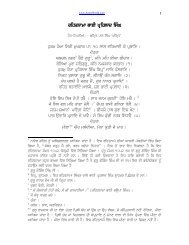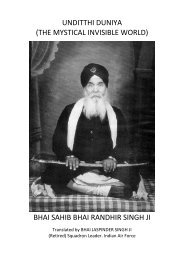Guru Gobind Singh's Death at Nanded Examination of - Vidhia.com
Guru Gobind Singh's Death at Nanded Examination of - Vidhia.com
Guru Gobind Singh's Death at Nanded Examination of - Vidhia.com
Create successful ePaper yourself
Turn your PDF publications into a flip-book with our unique Google optimized e-Paper software.
16 AN EXAMINATION OF SUCCESSION THEORIES<br />
n<strong>at</strong>ural de<strong>at</strong>h or disappears—deceiving and defying God and His<br />
n<strong>at</strong>ural laws—along with his physical body <strong>of</strong> flesh and blood,<br />
his dress <strong>of</strong> cotton and silk, his worldly arms and ornaments<br />
<strong>of</strong> iron, silver and gold, nay even with his pet horse along<br />
with its embroidered saddle and trappings. Or, after his<br />
de<strong>at</strong>h and crem<strong>at</strong>ion whereby the body is reduced to ashes, he<br />
rises up again and moves about not openly amongst the<br />
men <strong>of</strong> this world but secretly, known only to unknown men,<br />
who existed only in the imagin<strong>at</strong>ion <strong>of</strong> poets and fablers<br />
or in the whims <strong>of</strong> abnormal people.<br />
To them he alone is a prophet or an inspired leader<br />
who exhibits supern<strong>at</strong>ural powers and works miracles. Therefore,<br />
the ultra-enthusiastic devotees would cre<strong>at</strong>e fables out <strong>of</strong><br />
their fertile imagin<strong>at</strong>ion and so intersperse and weave them<br />
in the life-stories <strong>of</strong> their heroes, saints and prophets as to<br />
make an integral part <strong>of</strong> them. But a fable is after all a<br />
fable, a fictitious story. And it betrays itself. Such stories<br />
have found their way into the lives <strong>of</strong> Lord Christ and Prophet<br />
Muhammad and <strong>of</strong> gods and goddesses and <strong>of</strong> Buddhist<br />
and Jain saints and sages. Even the Sikh <strong>Guru</strong>s, who lived and<br />
moved about in the historical period, could not escape them.<br />
<strong>Guru</strong> <strong>Gobind</strong> Singh was a man <strong>of</strong> this earth, a historical<br />
man, who made his countrymen realize th<strong>at</strong> life was real<br />
and earnest and not maya and mithya. It was, therefore,<br />
worth living, not in wasteful pursuits <strong>of</strong> empty show and<br />
momentary pleasure but in the service <strong>of</strong> man—for the uplift<br />
and advancement <strong>of</strong> goodness and resistance <strong>of</strong> evil. Th<strong>at</strong><br />
was the mission <strong>of</strong> his life which he so <strong>of</strong>ten declared in<br />
unambiguous resounding words. He was no doubt an extraordinary<br />
man, a fully realized being. But he was not<br />
supern<strong>at</strong>ural, outside the oper<strong>at</strong>ion <strong>of</strong> the laws <strong>of</strong> n<strong>at</strong>ure.<br />
He was born like all other men, lived in this world among<br />
and for other men and died a n<strong>at</strong>ural de<strong>at</strong>h like all other<br />
men <strong>of</strong> the world. To make something unn<strong>at</strong>ural, supern<strong>at</strong>ural<br />
or a god <strong>of</strong> him is to go against his own words<br />
wherein he has declared in clear language th<strong>at</strong> he was but a<br />
man, a slave <strong>of</strong> the Almighty Lord, and those who called<br />
GURU GOBIND SINGH S DEATH AT NANDED 17<br />
him God should fall into the pit <strong>of</strong> hell :<br />
§ sra ?raor 33 Hfa ufe d i<br />
W H §H S fra Ug^ M32.il<br />
^¥S WH TM3 SHTRT ... 113311<br />
Those who call me God, shall fall into the pit-<strong>of</strong> hell.<br />
Consider me to be a slave <strong>of</strong> His. Have no doubt<br />
about it.<br />
I am but a slave <strong>of</strong> the Almighty Lord, and have <strong>com</strong>e to<br />
see the spectacle <strong>of</strong> the world.<br />
[Bachittar N<strong>at</strong>ak, vi, 32, 33.]<br />
India has no doubt been the land <strong>of</strong> gre<strong>at</strong> philosophers,<br />
poets and masters <strong>of</strong> astrology, astronomy and many<br />
other sciences. But as believers in the unreality <strong>of</strong> human<br />
life which, according to their neg<strong>at</strong>ive philosophy, was maya<br />
and mithya, illusory and unreal, they paid no serious<br />
<strong>at</strong>tention to history, the objective recording <strong>of</strong> its activities.<br />
In an unreal world they saw no sense in keeping accounts <strong>of</strong><br />
the transitory lives <strong>of</strong> the human beings who were but insignificant<br />
cre<strong>at</strong>ures in this vast universe. With this philosophy<br />
and <strong>at</strong>titude, the scholars <strong>of</strong> ancient India could not appreci<strong>at</strong>e<br />
and develop the discipline <strong>of</strong> history. They were poets<br />
par excellence, no doubt. But poets are men <strong>of</strong> imagin<strong>at</strong>ion<br />
and emotion. They <strong>at</strong> times rise to gre<strong>at</strong> heights far above<br />
the unalloyed truths <strong>of</strong> life, and in their flights <strong>of</strong> imagin<strong>at</strong>ion<br />
they cre<strong>at</strong>e a world <strong>of</strong> their own and present things<br />
and happenings <strong>of</strong> this world in their own subjective manner,<br />
not un<strong>of</strong>ten far removed from reality. In this, the poets<br />
say, lies the skill and beauty <strong>of</strong> this art. This is particularly<br />
the case with the Braja-bhasha poets under the influence<br />
<strong>of</strong> their ancient liter<strong>at</strong>ure. The poets <strong>of</strong> other Indian languages,<br />
including Panjabi, have not lagged behind them in the<br />
introduction <strong>of</strong> fables and supern<strong>at</strong>ural element in their<br />
epical narr<strong>at</strong>ives. Thus, history in the hands <strong>of</strong> imagin<strong>at</strong>ive<br />
and emotional poets and fablers is very <strong>of</strong>ten mutil<strong>at</strong>ed



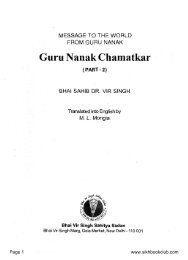
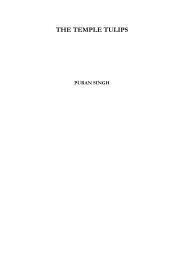
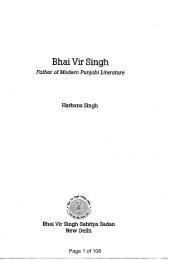

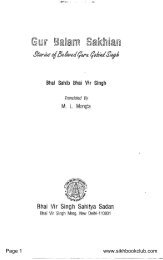
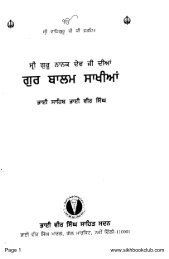
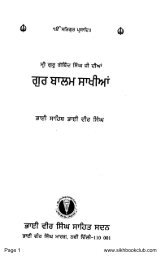
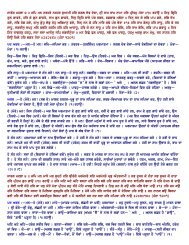
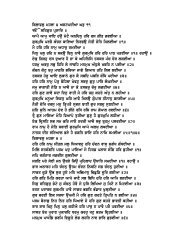
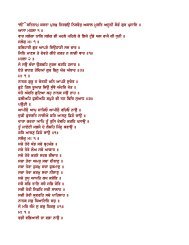
![cOpeI ] hmrI kro hwQ dY r~Cw ] pUrn hoie ic~q kI ie ... - Vidhia.com](https://img.yumpu.com/12240258/1/190x245/copei-hmri-kro-hwq-dy-rcw-purn-hoie-icq-ki-ie-vidhiacom.jpg?quality=85)
